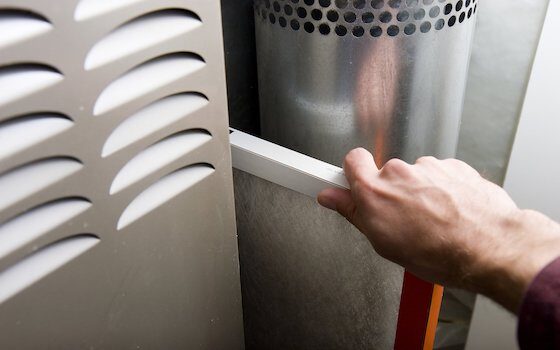How often should you change your furnace filter in the winter?
The usage of an HVAC system depends on the owners under various circumstances. The area, indoor dust level, smoke, everything differs. The air filters of the unit also work according to these circumstances. The standard time in which you should consider changing your air filters is 60-90 days.
For cleaner air, change, the furnace air filters at regular intervals without a miss. The particle deposition blocks the filter ultimately, which will hinder the air plus won’t trap the dust particles anymore. Breathing in the environment is not a good idea as it can lead to many severe respiratory issues. The furnace’s role is to generate warm air, but it will fail to deliver it. The continuous cycle of the furnace will take up more energy hence will reduce the furnace’s capacity.
How would you know when to change air filters exactly? There are some signs that you can pay attention too when you think your furnace is working in full efficiency:
If you notice more dust than usual, then you know where the issue can be.
While inspecting, you notice a visibly dirty filter.
The furnace is running continuously without a break. If you notice no automatic cut, then that load on the furnace might be because of air filter failure.
If you smell something unusual around your furnace, this points towards the no proper functioning of the furnace filters.
The various factors that depend on the owner to owner can help you understand how frequent you should replace the furnace filters:
Pet: If you’re an animal lover, then you should replace your filters in every 30 days. The furry pet hair gets stuck in the air filters that decrease the performance of the furnace and life of filters. Also, cleaning pet fur from the filter on regular basis will be a good practice to breathe in the fresh air.
Ventilation: If you love some fresh natural air and frequently open windows or doors for good ventilation then that might reduce the life of furnace filters. The air carrying dust particles will accumulate around your place. Get a higher quality of air filter and consider changing at least once in two months.
Heater Fan: The heater fan working time is inversely proportional to the age of furnace filters. If you’re continuously using your furnace in maximum hours of the day then air filters should be replaced in 60-90 days.
Dirty house: It is very important to keep your place clean for the long life of furnace filters. It is a mandatory step to keep filters clean and replace them every 90 days, breathe in healthy indoor air.
Call 800-482-8224 to schedule an appointment with an Amazon Air Duct Cleaning Professional today!
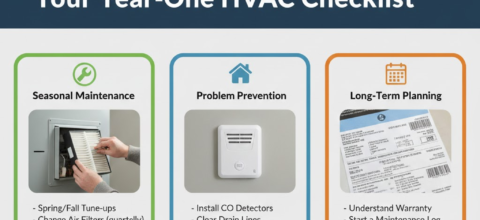
Congratulations on your new home! Between unpacking boxes and picking paint colors, your HVAC system probably isn’t top of mind. But a little attention now can save you from surprise repair bills later. If you’re a first time home buyer figuring out what to do with hvac equipment, this guide breaks down the basics for your first 12 months. Most of these tasks are
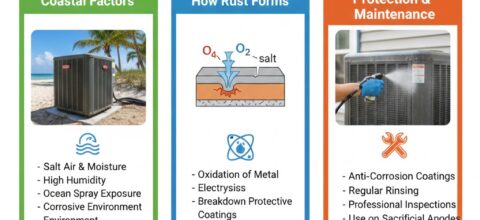
Living near the coast comes with great views and ocean breezes. But salt air brings a hidden problem. It’s constantly corroding your outdoor AC unit. If you’ve spotted rust on your condenser or noticed your cooling performance dropping, salt damage might be the reason. Here’s what’s happening and what you can do about it. What Happens When Salt Gets Into Your Air Conditioner Your
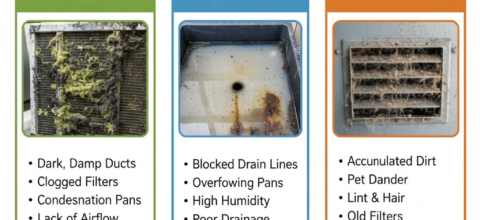
You turn on the heat or AC and suddenly there’s an odor you can’t ignore. Sometimes it’s damp and musty. Other times it smells like something burning. You might not be able to describe it exactly, but you know something’s off. Different smells mean different things. Some are harmless. Others need immediate attention. Here’s how to figure out what you’re dealing with. Why Does
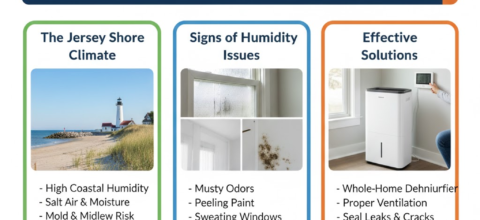
Beach living comes with perks. You get ocean views, morning walks on the sand, and that salt air. But if you own a home in Ocean County, you know the weather can take a toll on your home. Humidity gets into everything and won’t leave. Maybe you’ve noticed your windows fogging up even though the AC is on. Or there’s a smell in the

Ever stood in the filter aisle at the hardware store feeling completely lost? MERV 8, MERV 11, MERV 13. The numbers keep climbing, and so do the prices. You grab one and hope it’s right. Turns out, the most expensive filter isn’t always the best choice. Sometimes it can cause problems. Let’s figure out what these ratings mean and which one belongs in your

Congratulations on your new home! Between unpacking boxes and picking paint colors, your HVAC system probably isn’t top of mind. But a little attention now can save you from surprise repair bills later. If you’re a first time home buyer figuring out what to do with hvac equipment, this guide breaks down the basics for your first 12 months. Most of these tasks are

Living near the coast comes with great views and ocean breezes. But salt air brings a hidden problem. It’s constantly corroding your outdoor AC unit. If you’ve spotted rust on your condenser or noticed your cooling performance dropping, salt damage might be the reason. Here’s what’s happening and what you can do about it. What Happens When Salt Gets Into Your Air Conditioner Your

You turn on the heat or AC and suddenly there’s an odor you can’t ignore. Sometimes it’s damp and musty. Other times it smells like something burning. You might not be able to describe it exactly, but you know something’s off. Different smells mean different things. Some are harmless. Others need immediate attention. Here’s how to figure out what you’re dealing with. Why Does

Beach living comes with perks. You get ocean views, morning walks on the sand, and that salt air. But if you own a home in Ocean County, you know the weather can take a toll on your home. Humidity gets into everything and won’t leave. Maybe you’ve noticed your windows fogging up even though the AC is on. Or there’s a smell in the

